Unit 10 Pompeii教案
- 格式:doc
- 大小:27.00 KB
- 文档页数:1
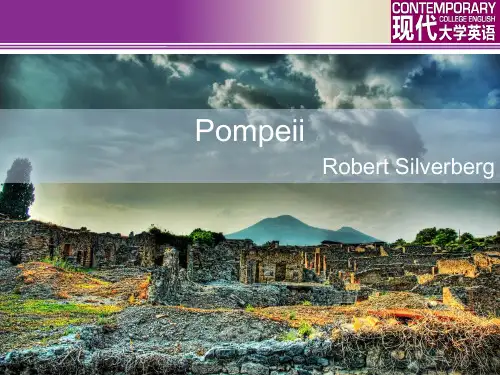
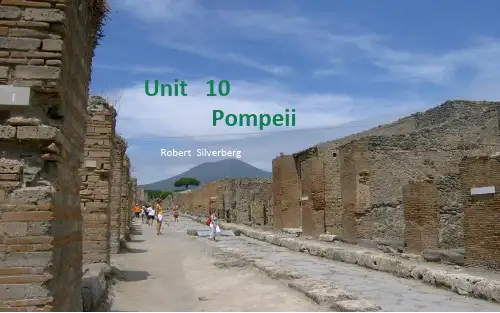
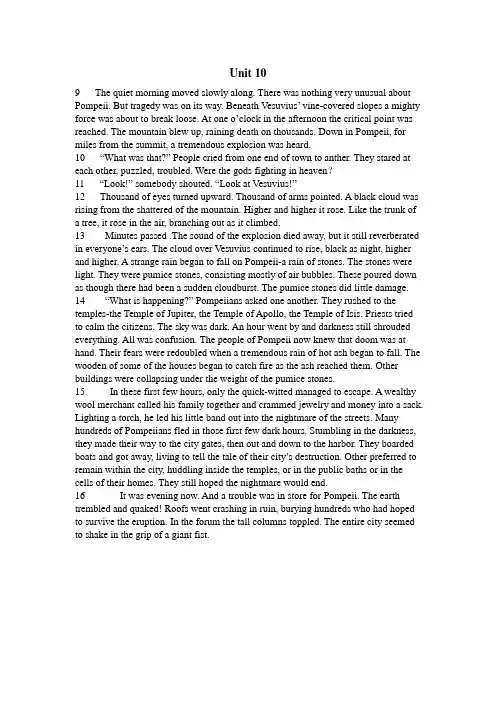
Unit 109 The quiet morning moved slowly along. There was nothing very unusual about Pompeii. But tragedy was on its way. Beneath Vesuvius’ vine-covered slopes a mighty force was about to break loose. At one o’clock in the afternoon the critical point was reached. The mountain blew up, raining death on thousands. Down in Pompeii, for miles from the summit, a tremendous explosion was heard.10 “What was that?” People cried from one end of town to anther. They stared at each other, puzzled, troubled. Were the gods fighting in heaven?11 “Look!” somebody shouted. “Look at Vesuvius!”12 Thousand of eyes turned upward. Thousand of arms pointed. A black cloud was rising from the shattered of the mountain. Higher and higher it rose. Like the trunk ofa tree, it rose in the air, branching out as it climbed.13 Minutes passed .The sound of the explosion died away, but it still reverberated in everyone’s ears. The cloud over Vesuvius continued to rise, black as night, higher and higher. A strange rain began to fall on Pompeii-a rain of stones. The stones were light. They were pumice stones, consisting mostly of air bubbles. These poured down as though there had been a sudden cloudburst. The pumice stones did little damage. 14 “What is happening?” Pompeiians asked one another. They rushed to the temples-the Temple of Jupiter, the Temple of Apollo, the Temple of Isis. Priests tried to calm the citizens. The sky was dark. An hour went by and darkness still shrouded everything. All was confusion. The people of Pompeii now knew that doom was at hand. Their fears were redoubled when a tremendous rain of hot ash began to fall. The wooden of some of the houses began to catch fire as the ash reached them. Other buildings were collapsing under the weight of the pumice stones.15 In these first few hours, only the quick-witted managed to escape. A wealthy wool merchant called his family together and crammed jewelry and money into a sack. Lighting a torch, he led his little band out into the nightmare of the streets. Many hundreds of Pompeiians fled in those first few dark hours. Stumbling in the darkness, they made their way to the city gates, then out and down to the harbor. They boarded boats and got away, living to tell the tale of their city’s destruction. Other preferred to remain within the city, huddling inside the temples, or in the public baths or in the cells of their homes. They still hoped the nightmare would end.16 It was evening now. And a trouble was in store for Pompeii. The earth trembled and quaked! Roofs went crashing in ruin, burying hundreds who had hoped to survive the eruption. In the forum the tall columns toppled. The entire city seemed to shake in the grip of a giant fist.。
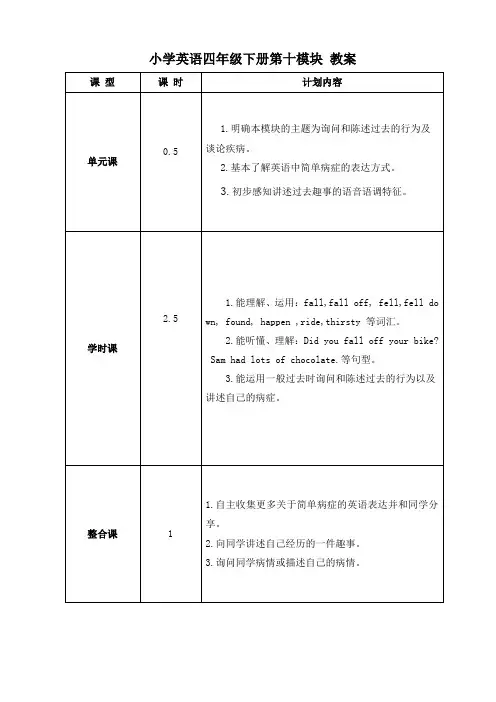
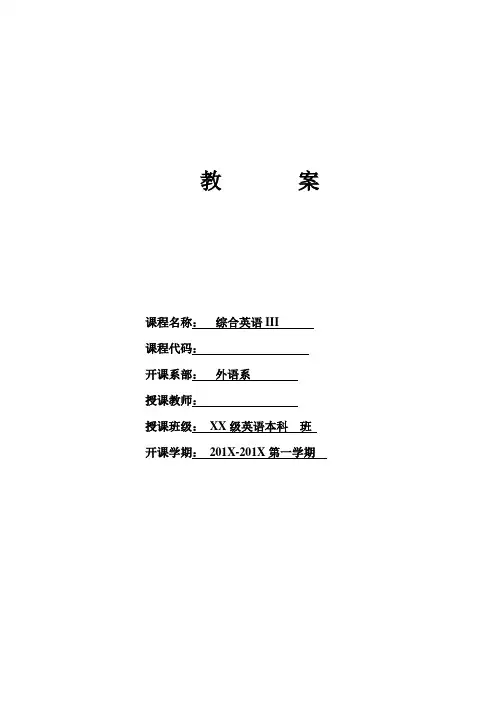
教案课程名称:综合英语III课程代码:开课系部:外语系授课教师:授课班级:XX级英语本科班开课学期:201X-201X第一学期一、课程简介课程类别:专业必修课授课对象:本科英语专业学时学分:68学时;学分2分使用教材:杨立民,《现代大学英语》,外语教学与研究出版社,20XX 年。
参考教材:杨立民,《现代大学英语精读教师用书》,外语教学研究出版社,20XX年。
宋兴蕴,《现代大学英语全程辅导》,辽宁师范大学出版社,20XX年。
薄冰,《薄冰英语语法》,开明出版社,1998年。
Martin Hewings,Advanced Grammar in Use, Foreign Language Teaching and Research Press& Cambridge University Press, 2001, 1st Edition.Sally Wehmeier, Oxford Advanced Learner’s English-Chinese Dictionary, The Commercial Press& Oxford University Press, 2004, 6th Edition.二、教学目标语音:能自觉地模仿和正音,正确掌握多音节单词、复合词和句子的常见重音模式;初步掌握朗读和说话的节奏感,并注意轻重变化对意义表达的影响;初步掌握语流中的语音变化规律、连续、辅音爆破和语音同化的技巧以及陈述句、疑问句和祈使句的语调。
语法:掌握主谓一致关系、表语从句、宾语从句、定语从句和状语从句等句型、直接引语和间接引语的用法、动词不定式和分词的用法、各种时态、主动语态、被动语态和构词法。
词汇:通过基础英语课、阅读课和其他途径认知词汇达4000—5000个(其中含中学已学2100个),正确而熟练地使用其中的2000—2500个及其最基本的搭配。
翻译:能独立完成课程中的各种翻译练习,要求理解准确、语言通顺;能借助词典将难度相当于所学教材里的英语对话、短文、一般性题材的文字材料译成汉语,翻译速度为每小时约220个英语单词,要求译意准确,文字通顺;能借助词典将内容熟悉的汉语文字材料译成英语,翻译速度为每小时约170个汉字,要求译意准确,文字通顺。
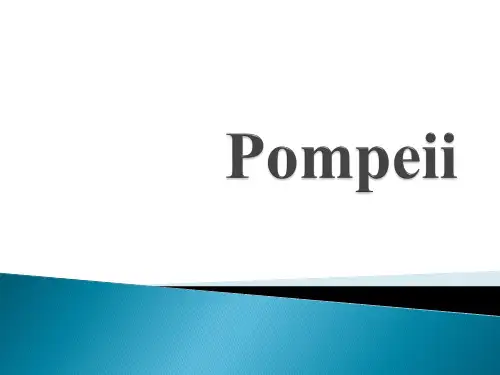
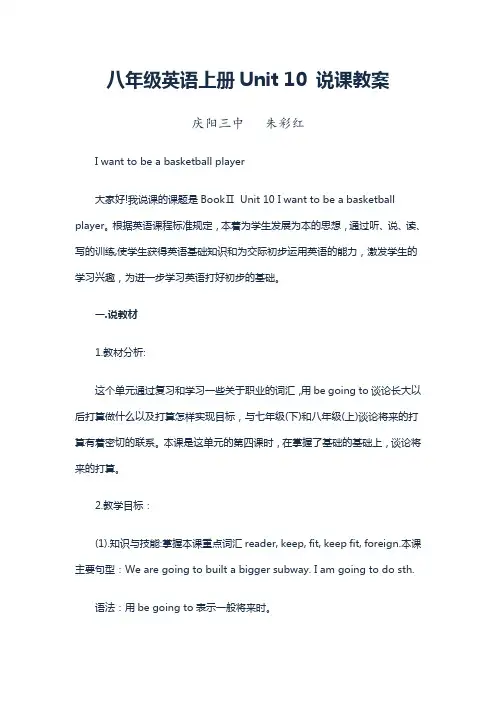
八年级英语上册Unit 10 说课教案庆阳三中朱彩红I want to be a basketball player大家好!我说课的课题是BookⅡUnit 10 I want to be a basketball player。
根据英语课程标准规定,本着为学生发展为本的思想,通过听、说、读、写的训练,使学生获得英语基础知识和为交际初步运用英语的能力,激发学生的学习兴趣,为进一步学习英语打好初步的基础。
一.说教材1.教材分析:这个单元通过复习和学习一些关于职业的词汇,用be going to谈论长大以后打算做什么以及打算怎样实现目标,与七年级(下)和八年级(上)谈论将来的打算有着密切的联系。
本课是这单元的第四课时,在掌握了基础的基础上,谈论将来的打算。
2.教学目标:(1).知识与技能:掌握本课重点词汇reader, keep, fit, keep fit, foreign.本课主要句型:We are going to built a bigger subway. I am going to do sth.语法:用be going to表示一般将来时。
(2).能力目标:培养学生应用英语谈论将来计划,提高学生听、说、读、写等能力。
(3).情感态度价值观:通过谈论将来打算做什么以及准备怎样实现目标,让学生考虑自己的将来,及早为将来做好准备。
培养学生学习英语的强烈兴趣,乐于参加各种活动的积极情感,善于合作.(4).教学重、难点:重点是掌握本课重点词汇reader, keep, fit, keep fit, foreign.本课主要句型:We are going to built a bigger subway. I am going to do sth.语法:用be going to表示一般将来时。
难点是一般将来时be going to中be的具体形式和后面接动词原形的用法, 而学生运用所学知识谈论自己打算怎样做来实现目标则既是难点,又是能力训练点。
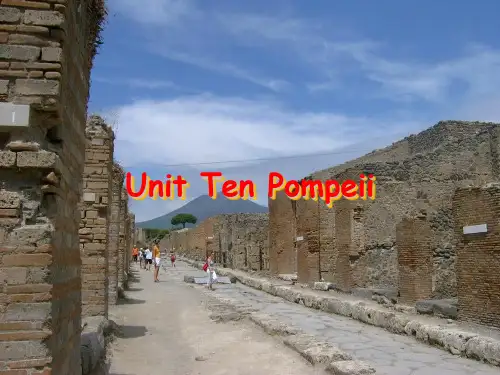
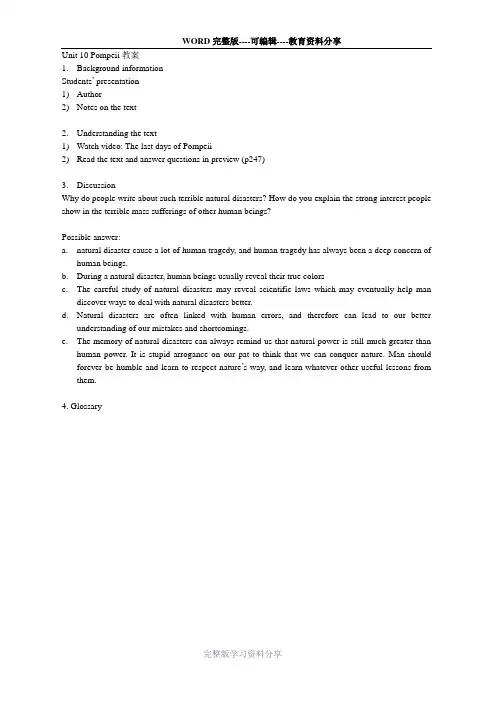
WORD完整版----可编辑----教育资料分享Unit 10 Pompeii教案1.Background informationStudents’ presentation1)Author2)Notes on the text2.Understanding the text1)Watch video: The last days of Pompeii2)Read the text and answer questions in preview (p247)3.DiscussionWhy do people write about such terrible natural disasters? How do you explain the strong interest people show in the terrible mass sufferings of other human beings?Possible answer:a.natural disaster cause a lot of human tragedy, and human tragedy has always been a deep concern ofhuman beings.b.During a natural disaster, human beings usually reveal their true colorsc.The careful study of natural disasters may reveal scientific laws which may eventually help mandiscover ways to deal with natural disasters better.d.Natural disasters are often linked with human errors, and therefore can lead to our betterunderstanding of our mistakes and shortcomings.e.The memory of natural disasters can always remind us that natural power is still much greater thanhuman power. It is stupid arrogance on our pat to think that we can conquer nature. Man should forever be humble and learn to respect nature’s way, and learn whatever other useful lessons from them.4. Glossary----完整版学习资料分享----。
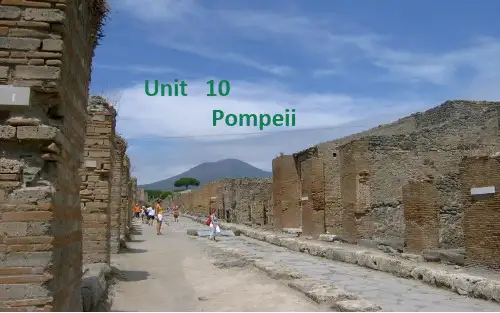
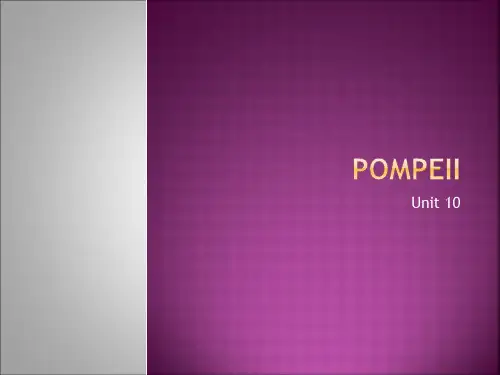
Unit 10 If you go to the party, you’ll have a great time!The First Period Section A (1a–1c)Teaching aims(教学目标)1. 掌握if + will (主将出现)的句式。
2. 能运用if + will谈论因果关系。
3. 学会合理的安排事情。
4. 思考自己的梦想并为之努力。
Language points(语言点)1.要求掌握以下词汇:1)名词n. jeans2) 动词v. wear3) 形容词adj. famous,usual4) 词组wear jeans, take the bus to, have a great time, be sorry, be late, stay at home, give up (本节课的生词较少,而且单词的拼写比较简单,所以学生学起来不会感到困难,可以鼓励学生当堂掌握。
)2. 要求掌握以下句式: I think I'll wear jeans to the party.If you do, the teachers won't let you in.Are you going to the party tomorrow night?Who will you go with?What’s your dream?My dream is to be a reporter.Difficulties(难点):掌握if+will(主将出现)的句式Teaching steps(教学步骤)1. Warm-up and revision(课堂热身)Brainstorm and talk about parties, e.g., types of parties, when to have them, whom to invite, what to bring, food and drinks, types of music, games/activities.2. Presentation(呈现if+will(主将出现)的句式)(1) Ask and answerT: What will you do if it rains tomorrow/your friend is late/you lose your watch/your teacher gives you more homework?S: I will…if it rains tomorrow/my friend is late/I lose my watch/my teacher gives me more homework .(教师从前面的歌曲自然导入目标句型,让学生自然地根据提示熟悉并应用句型)(2)Find rulesT: What will you do if it rains tomorrow/your friend is late/you lose your watch/your teacher gives you more homeworkS:I will call him/her if my friend is late.主句从句(教师结合前面的歌曲,自然问答后引入关键句型。
一、教学目标1. 知识与技能:(1)掌握课文中的生词和短语。
(2)理解课文的主要内容,提高阅读理解能力。
(3)学习运用历史背景知识分析问题。
2. 过程与方法:(1)通过小组讨论,培养学生的合作能力和批判性思维。
(2)通过角色扮演,提高学生的口语表达能力。
(3)通过写作练习,提高学生的写作技巧。
3. 情感态度与价值观:(1)了解古罗马文化,增强学生对历史的兴趣。
(2)培养学生珍惜现代生活的意识。
(3)激发学生对灾难预防的认识和重视。
二、教学重点与难点1. 教学重点:(1)课文中的生词和短语。
(2)课文的主要内容。
(3)运用历史背景知识分析问题。
2. 教学难点:(1)对古罗马文化的了解。
(2)对灾难预防的认识。
三、教学过程(一)导入1. 利用图片或视频展示古罗马文化和庞贝古城,激发学生的学习兴趣。
2. 提问:同学们对古罗马文化和庞贝古城有哪些了解?(二)课文阅读1. 学生自读课文,圈出生词和短语,查阅词典。
2. 教师检查学生自读情况,解释生词和短语。
3. 小组讨论:课文的主要内容是什么?4. 教师总结课文的主要内容。
(三)角色扮演1. 将学生分成小组,每组选择一个角色,如记者、考古学家、游客等。
2. 让学生根据课文内容,模拟庞贝古城被火山喷发时的场景,进行角色扮演。
3. 各小组展示角色扮演,其他小组进行评价。
(四)写作练习1. 让学生以“如果我是庞贝古城的幸存者”为题,写一篇短文。
2. 学生在写作过程中,注意运用所学词汇和句型。
3. 教师批改作文,给予学生反馈。
(五)课堂小结1. 回顾课文内容,总结所学知识。
2. 提问:同学们从这节课中学到了什么?3. 引导学生思考灾难预防的重要性。
四、作业布置1. 预习下一课,准备生词和短语。
2. 阅读有关古罗马文化和庞贝古城的资料,拓宽知识面。
五、教学反思1. 教师在课堂上应注重激发学生的学习兴趣,提高他们的参与度。
2. 通过多种教学方法,提高学生的阅读、写作和口语表达能力。
Module 10Unit 2Don't shout, please!【教学目标】1、通过图片、任务认领等环节,全部学生能初步学会运用祈使句型Don’t…2、通过听、跟读、自读等多种形式,98%学生能正确理解课文内容3、通过知识拓展、交流,90%以上的学生能了解公共场所常用图标的含义,并能用Don’t…句型表达4、通过较大容量的语言输入,初步培养学生用英语思考和交流的习惯及在情境中灵活运用所学句型的能力和知识迁移能力。
5、学生通过合作学习能够形成一定的团队精神,认识一些日常生活中的安全行为和文明行为,养成良好的社会公德和学习习惯。
【学情分析】五年级学生活泼好动,乐于参与活动、游戏和表演,喜欢唱歌,所以教学内容设计以任务驱动为主,给学生设计不同的任务,而任务的设计又与真实的生活息息相关,势必会引起学生极大的参与热情。
同时班级人数较较多,可以采用小组合作的形式,共同完成老师设计的不同学习任务,激发学生学习欲望,增强学生的合作竞争意识。
【教学重难点】重点:理解课文内容,能在适当的语境中用Don’t…句型表达自己的意愿。
难点:能结合所学的语言知识,通过联系生活实际,灵活运用祈使句型Don’t。
【课前准备】1.单词卡片/时间展示图;2.教学光盘或其他录音机设备;3.教学课件。
【教学过程】Step 1:Warmup1、Greetings.2、Free talkDo you like playing football? Don’t play footballDo you like skipping ? Don’t skip in the classroom.Do you like walk? Don’t walk on the grass(class—glass---grass)Step 2:Lead inWe know, 我们威海正在创建全国文明城,作为威海的小学生,应该为我们的创城工作尽一份力。
今天老师带来了三个任务:1、争做small civilization guards,(文明小卫士);2、用好Civilization Magnifier(文明放大镜);3、制作Civilization Rules(文明公约)。
教师学科教案[ 20 – 20 学年度第__学期]任教学科:_____________任教年级:_____________任教老师:_____________xx市实验学校Module 10 Spring Festival一、学习目标:1. 重点单词:festival, lantern, dragon, dance, clean, sweep, cook, meal, speak, happen, ready, quite, away, hard, floor, join, hurry, Christmas, February, January, before, luck, mean, table, celebrate, traditional, dumpling, programme, sweater, coat, lucky, tree, tell2. 重点短语:put away, hurry up, sweep away3.重点句子:1) Are you getting ready for Spring Festival?2) This is Tony speaking.3) What’s happening?4) —What are you doing at the moment?—I’m making big red lanterns.5) She’s cleaning the house and putting things away.6) —What are Daming and Betty doing?—They’re learning a dragon dance with my grandpa.7) What’s your mother doing?8) She’s cleaning the house.9) I’m eating jiaozi.二、重点及难点:1. Function: 1) How to describe and ask about the festival;2) Describe the process of preparing the festival.2. Grammar: The Present Continuous Tense.三、教学设计:Unit 3 Language in useⅠTeaching modelRevision and applicationⅡTeaching methodFormal and interactive practiceⅢTeaching aims1. To consolidate Present continuous questions and short answers2. To learn new words by using word map and pictures3. To write a letter about the Spring FestivalⅣTeaching ObjectivesKey vocabulary: finish, houseworkKey structures: Present simple with I, you, we, they prepositions of time at, in, on negative form of present simple don’t.ⅤTeaching aidsTape recorder, OHP, handoutsⅥTeaching StepsStep 1 RevisionReview the text of Unit 1 and Unit 2.Step 2 Language practice1. Read through the example sentences in the box with the whole class.2. Ask the students to repeat the sentences in the box.3. Grammar: The Present Continuous Tense.Step 3 Work in pairs1. Look at the pictures.2. Ask and answer: What can you see? What are they doing?3. Ask the students to talk about the pictures.4. Read through the example sentences with the whole class.Students A: Choose a picture. Say what the people are doing.Students B: Guess which picture Students A is describing.A: They are watching TV.B: Is it Picture 4?A: Yes, it is. / No, it isn’t.5. Work in pairs.Step 4 Writing1. Read through the example sentences in Activity2.Lingling’s mo ther / learning a lion dance?—Is Lingling’s mother learning a lion dance?—No, she isn’t.2. Read through the sentences in Activity 2.3. Write questions and short answers.4. Call back the answers from the whole class, check the answers.Keys:1. —I Is L ingling’s mother cleaning the house?—I Yes, she is.2. —Is Lingling’s father making lanterns?—No, he isn’t.3. —Is Lingling’s aunt cooking the meal?—No, she isn’t.4. —Is Lingling’s grandma sweeping the floor?—No, she isn’t.5. —Are Daming and Betty learning a lion dance?—No, they aren’t.5. Write questions and answers about the pictures in Activity 1 like this.. —What’s the boy doing?—He is using a computer.6. Call back the answers from the whole class, check the answers.Step 5 Complete the passage with the correct form of the words and expression in brackets.1. Read through the passage with the whole class.2. Ask the students to complete the passage with the correct form of the words and expression in brackets with a partner.3. Call back the answers from the whole class, check the answers.Keys:1. are getting ready2. are cleaning3. are sweeping4. is cooking5. work6. buy7.get 8. eat4. Read the passage together.Step 6 Around the world:1. Ask the students to look at the picture and discuss what they can see.2. Read through the information with the whole class, and talk something about them.3. Ask and answer.4. Read the passage together.Step 7 Module task: Writing a letter about Spring Festival to a foreign student.1. Work in pairs. Ask and answer questions about what you and your family are doing for Spring Festival at the moment.—What are you and your family doing for Spring Festival at the moment ?— My mother is cooking.2. Write notes about your Spring Festival. Use the headings to help you.Getting ready Food Presents Traditions3. Write a letter to a friend saying:What you’re doing for Spring Festival at the moment.What you usually do.Use your notes in Activity 6 and 7.Step 8 Exercise根据短文内容及首字母提示,在空格处填入正确的词,使短文意思完整。
1 Module 10单元教材 分析本模块的话题便围绕At the Spring Festival At the Spring Festival,以,以We have We have~这个~这个句型为依托,较为集中地进行了一些名词的教学,如family family、、year year、、festiveal 等。
这一模块两个单元分别从我们的节日出发,这一模块两个单元分别从我们的节日出发,通过创设学生通过创设学生熟悉的语言情景,用这些名词来频繁地描述我们熟悉的节日,以达到语言习得的目的。
我觉得我们的教学思路应循着教材来源于生活,又回归到生活的理念,借助教材学习表达,创设实际情景习得语言。
单元教学 目标一、知识与技能一、知识与技能1.1.能正确地听说读写单词能正确地听说读写单词family,dinner,festival 等新单词。
等新单词。
2.2.学会本单元的常用口语,正确运用关于节日的句型。
学会本单元的常用口语,正确运用关于节日的句型。
二、过程与方法二、过程与方法1.1.引导学生在课文情景中感知语言;引导学生在课文情景中感知语言;2.2.培养学生听、说和运用英语的能力;培养学生与他人合作的能力。
培养学生听、说和运用英语的能力;培养学生与他人合作的能力。
三、情感、态度、价值观三、情感、态度、价值观1.1.通过学习让学生感受赞赏别人带给自己和他人的快乐。
通过学习让学生感受赞赏别人带给自己和他人的快乐。
2.2.激发学生学习英语的兴趣。
激发学生学习英语的兴趣。
单 元 训 练 重 难 点重 点难 点1.1.能够正确运用新的句型“能够正确运用新的句型“At the At the spring festival spring festival”和“”和“We have We have…这个…这个句型”来谈论关于节日的特点。
句型”来谈论关于节日的特点。
2.2.掌握单词掌握单词family 等月份名词。
等月份名词。
Unit 2Merry Christmas!【教学目标】知识目标:能听懂,会说,初步认读Merry,Christmas,发音正确。
能听懂句子Merry Christmas并能用Merry Christmas回答。
能用Merry Christmas向别人表达圣诞祝福,语音语调正确。
了解有关圣诞节的风俗。
技能目标:让学生在特定的情景下运用所学的知识。
培养学生实际运用英语的能力。
情感目标:学生能了解中西方文化,习俗差异,增强世界意识。
通过游戏,歌曲,情境创设等活动,提高学生课堂的参与度和学习英语的兴趣。
【学情分析】本班共有30名学生,其中男生14人,女生16人。
学生总体反映活泼好动,纯真可爱。
孩子们上课时能够专心听讲,能够积极主动的发言,思想比较单纯,善于提问。
但有些学生还是为学习而学习,谈不上兴趣问题;个别同学在课堂上纪律不是很好,还存在顽劣和懒惰倾向,上课听课不专心,爱搞小动作、课下作业完成不及时的坏毛病,学习效率也较差。
在下面的教学中我准备从以下几个方面来开展:(1)培养学生良好的学习习惯。
课堂教学对学生学习行为和学习方法的培养具有重要作用,是培养良好行为习惯的主要途径,学生的养成教育是一个"知之深、受之切、意更坚、行必果"的过程,我们教师在教学中要始终注意与学生的实际相结合,在课堂中捕捉每一个可利用的环节,培养学生的良好学习习惯,给学生提供适当的榜样示范,让学生养成课前预习,课上专心听讲,课后复习的好习惯,用实践来填平认知与行为之间的鸿沟。
(2)给予学生鼓励、肯定的评价。
小学生有强烈的表现欲,他们喜欢得到别人的表扬,老师的表扬能积极推动他们的学习。
运用富有灵活性的表扬语肯定学生,他们会因此而继续努力。
小奖品的巧用也能激励学生主动地学习英语。
平时,我在教学中,时时注意课堂上表现最活跃的学生和进步的学生,尤其注意那些学困生,经常给予积极的鼓励。
如默写满分奖,作业全对奖等小奖品的魅力,给学生带来了极大的吸引力和乐趣,激发他们主动地参与到教学活动中来。